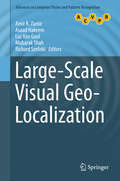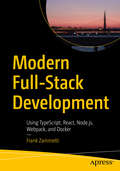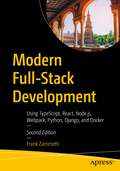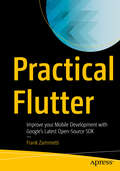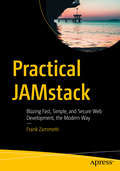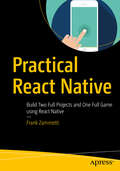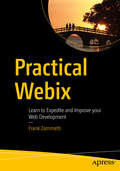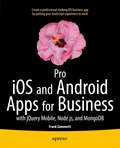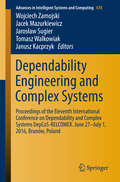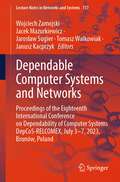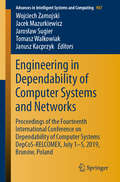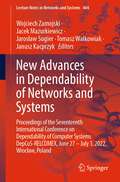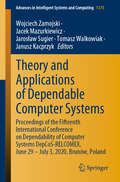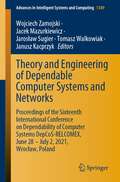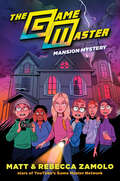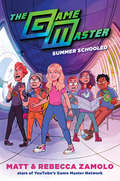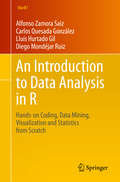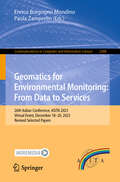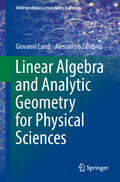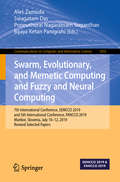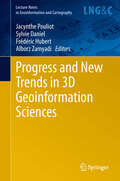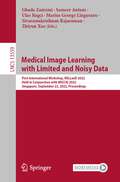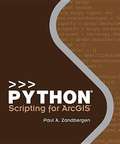- Table View
- List View
Large-Scale Visual Geo-Localization
by Amir R. Zamir Asaad Hakeem Luc Van Gool Mubarak Shah Richard SzeliskiThistimely and authoritative volume explores the bidirectional relationship betweenimages and locations. The text presents a comprehensive review of the state ofthe art in large-scale visual geo-localization, and discusses the emergingtrends in this area. Valuable insights are supplied by a pre-eminent selectionof experts in the field, into a varied range of real-world applications ofgeo-localization. Topics and features: discusses the latest methods to exploitinternet-scale image databases for devising geographically rich features andgeo-localizing query images at different scales; investigates geo-localizationtechniques that are built upon high-level and semantic cues; describes methodsthat perform precise localization by geometrically aligning the query imageagainst a 3D model; reviews techniques that accomplish image understandingassisted by the geo-location, as well as several approaches for geo-localizationunder practical, real-world settings.
Lattice Coding for Signals and Networks
by Ram ZamirUnifying information theory and digital communication through the language of lattice codes, this book provides a detailed overview for students, researchers and industry practitioners. It covers classical work by leading researchers in the field of lattice codes and complementary work on dithered quantization and infinite constellations, and then introduces the more recent results on 'algebraic binning' for side-information problems, and linear/lattice codes for networks. It shows how high dimensional lattice codes can close the gap to the optimal information theoretic solution, including the characterisation of error exponents. The solutions presented are based on lattice codes, and are therefore close to practical implementations, with many advanced setups and techniques, such as shaping, entropy-coding, side-information and multi-terminal systems. Moreover, some of the network setups shown demonstrate how lattice codes are potentially more efficient than traditional random-coding solutions, for instance when generalising the framework to Gaussian networks.
Modern Full-Stack Development: Using TypeScript, React, Node.js, Webpack, and Docker
by Frank ZammettiExplore what React, Node, TypeScript, Webpack, and Docker have to offer individually, and how they all fit together in modern app development. React is one of the most popular web development tools available today, and Node.js is extremely popular for server-side development. The fact that both utilize JavaScript is a big selling point, but as developers use the language more, they begin to recognize the shortcomings, and that’s where TypeScript comes in and why it’s gaining in popularity quickly. Add Webpack and Docker to the mix, and you’ve got a potent full development stack on which to build applications.You’ll begin by building a solid foundation of knowledge and quickly expand it by constructing two different real-world apps. These aren’t just simple, contrived examples but real apps that you can choose to install on your servers and use for real. By the end, you will have a solid grasp of building apps with React, Node.js, and TypeScript and a good grasp on how Webpack can be used to optimize and organize your code for deployment. You’ll also understand how Docker can be used to run the apps you build in a clear and well-defined way, all of which will be able to springboard you into creating more advanced apps on your own. What You'll Learn Get a project started and logically structure itConstruct a user interface with React and Material-UI Use WebSockets for real-time communication between client and serverBuild a REST API with Node and Express as another approach to client-server communicationPackage the app with Webpack for optimized deliveryTake a completed app and wrap it up with Docker for easy distributionReview a host of other ancillary topics including NPM, Semantic versioning, Babel, NoSQL, and more Who This Book Is For Web developers with basic knowledge of HTML, JavaScript, CSS, and CLI tools who are interested in and in all aspects of application development, and using TypeScript instead of straight JavaScript.
Modern Full-Stack Development: Using TypeScript, React, Node.js, Webpack, Python, Django, and Docker
by Frank ZammettiExplore what React, Node, Python, Django, TypeScript, Webpack, and Docker have to offer individually, and how they all fit together in modern app development. This updated version will show you how to build apps with React, Node.js or Django, and TypeScript, and how Webpack can be used to optimize and organize your code for deployment.You’ll begin by building a solid foundation of knowledge and quickly expand it by constructing three different real-world apps. These aren’t just simple, contrived examples but real apps that you can choose to install on your servers and use for real. You’ll also understand how Docker can be used to run the apps you build in a clear and well-defined way, all of which will be able to springboard you into creating more advanced apps on your own.You'll see why React is one of the most popular web development tools available today, and why Node.js is also frequently used for server-side development. The fact that both utilize JavaScript is a big selling point, but there are shortcomings. Modern Full-Stack Development highlights how adding Django, Webpack, and Docker to the mix resolves any issues by creating a potent full development stack on which to build applications – two possible stacks, really!! What You'll Learn:Review the basics of TypeScript and writing both React and Node apps with itConstruct a project with NPM and Webpack, configuration and usageUtilize client-side and server-side developmentEmploy REST APIs and database usage across two tech stacks, Node and Python/DjangoDeploy apps using Docker Who This Book Is For: Web developers and software architects.
Practical Flutter: Improve your Mobile Development with Google’s Latest Open-Source SDK
by Frank ZammettiExplore what Flutter has to offer, where it came from, and where it’s going. Mobile development is progressing at a fast rate and with Flutter – an open-source mobile application development SDK created by Google – you can develop applications for Android and iOS, as well as Google Fuchsia.Learn to create three apps (a personal information manager, a chat system, and a game project) that you can install on your mobile devices and use for real. You will begin by getting a solid foundation of Flutter knowledge, and building on it immediately by constructing two more traditional productivity apps.. You will also learn to create a game, enabling you to see a whole other perspective on what Flutter can do. In addition to building these apps, you'll have the benefit of reviewing real-world issues you might encounter, along with ways to deal with them through tips and tricks, all designed to make your Flutter experience that much more productive and, frankly, fun!Practical Flutter will leave you with a solid grasp of how to build apps with Flutter, and springboard into creating more advanced apps on your own. By the time your journey through this material concludes, another larger one will begin as you springboard, well-prepared, into the larger world of Flutter development, tackling any project that comes your way with aplomb. Practical Flutter is a learning adventure you won't want to miss.What You'll LearnGet a Flutter project started and logically structure itUse the interface elements Flutter provides, such as widgets, controls, and extensionsBuild layouts using interface elementsUse available tooling, specifically Android StudioLeverage server-side development and connect a Flutter app to a server back-end. Who This Book Is ForMobile developers who are looking to build for multiple mobile platforms and trying to do so with a codebase that is largely the same across all. Basic knowledge of iOS and Android generally, and some general programming experience is expected.
Practical JAMstack: Blazing Fast, Simple, and Secure Web Development, the Modern Way
by Frank ZammettiLearn what JAMstack is all about, what those three big letters in the front mean and why it’s so beneficial. This book shows you how to create sites and apps on the JAMstack using GatsbyJS, a tool made specifically for generating them. As part of that, you’ll learn about React, one of the hottest front-end development tools out there today. You will build three separate projects, starting with a relatively simple site to get your feet wet, then a more robust and dynamic application to see more advanced topics like API usage and data storage. Finally, you’ll build a game on the JAMstack to get a whole different perspective on how all the pieces can fit together. JAMstack, a modern take on best practices, is taking the web development world by storm and allowing developers to create web site and apps that are blazingly fast and highly secure. In many ways JAMstack is a throwback to web development of yesteryear, all while providing a simpler development experience that is streamlined by many years of best practices being brought to bear. What You'll Learn Review the principles of JAMstack: Javascript, APIs and MarkupUse React to build a front-endSet up a GitHub account and hosting using GitHub PagesHost in Netlify (the creators of JAMstack!)Understand Netlify functions and FaunaDB for persistent data storageExplore GraphQL usage for querying dataWork with the Phaser game library Who This Book Is ForWeb developers with some HTML, CSS and JavaScript experience, who want to apply best practices to build web sites that have no back-end server infrastructure while still providing dynamic content along with a streamlined development process. Architects who just want to learn JAMstack, even if they aren’t going to be hacking code all day.
Practical React Native: Build Two Full Projects and One Full Game using React Native
by Frank ZammettiDiscover how to use React Native in the real world, from scratch. This book shows you what React Native has to offer, where it came from, and where it’s going. You'll begin with a solid foundation of practical knowledge, and then build on it immediately by constructing three different apps. You'll learn how to use each feature of React Native by working on two full projects and one full game. These aren’t just simple React Native Hello World examples (although you’ll naturally start there!) but are apps that you can, if you so choose, install on your mobile devices and use for real. Throughout this book, you'll gain real-world familiarity with React Native as well as supporting components from Expo, NativeBase, React Navigation and the Redux and Lodash libraries. You'll also build server-side code for a mobile React Native app to talk to using the popular Node.js and Socket.io library, providing you a holistic view of things even beyond React Native. And, you'll see many helpful tips, tricks and gotchas to watch out for along the way!Practical React Native offers practical exercises that will give you a solid grasp of building apps with React Native, allowing you to springboard into creating more advanced apps on your own.Creating a game with React Native will allow you to see a whole other perspective on what React Native can do.What You'll Learn Master the basics of React NativeCreate a logically structured projectReview interface elements, such as widgets, controls, and extensionsBuild layoutsWork with Expo, an open source toolchain Who This book Is ForThe primary audience is mobile developers and anyone looking to build for multiple mobile platforms and trying to do so with a codebase that is largely the same across all. Readers will need a decent foundation, but not necessarily be experts in, HTML, CSS, and JavaScript, but I'll assume little beyond that.
Practical Webix: Learn To Speed Up Your Web Development
by Frank ZammettiLearn to create speedy cross-platform applications with ease using Webix. You will begin with an introduction to Webix and basic usage, exploring the interface components and utilities it offers, as well as the tools available (skin builder, form builder, and code snippet testing facility).You’ll understand how Webix can integrate with other popular libraries and frameworks including Angular, Vue, React and more (as well as third-party components like dHTMLx and rich text editors). You will learn tangential topics including communication with back-end systems (Node.js and common related tooling), packaging as a Cordova app and, of course, you will learn how to use Webix following the Progressive Web App delivery mechanism.Offering a complete solution in a single bundle, this JavaScript UI framework provides a rich set of interface components, application architecture direction and commonly-needed utility and ancillary capabilities.Every topic will be taught a practical way, explored within the context of building real-world working apps, not through unrelated snippets. Bringing 25 years of professional development experience to the table, author Frank Zammetti uses his unique levity to teach you how to get up and running with this new and upcoming framework. What You’ll Learn Explore the capabilities and UI widgets it provides and the features that make it stand out from its competitorsBuild one web technology-based app that works on both desktops and mobile devices (Android and iOS)Create and hook a Webix app up to a Node.js/Express-based RESTful server API for data storageMobilize a Webix app using both PhoneGap and Progressive Web App techniquesEnhance your Webix and general development skills in the most fun way possible: by building a gameWho This Book Is For Moderately experienced front-end developers who want to learn about Webix and the power it brings to client-side development. Developers looking to use their web development skills to build cross-platform apps that work on both desktop and mobile devices with Webix as the foundation.A working knowledge of CSS, HTML and JavsScript is assumed, though you don’t need to be an expert.
Pro iOS and Android Apps for Business
by Frank ZammettiWith Pro iOS and Android Apps for Business, you can take your web development experience and apply it toward creating a full-featured business app, from soup to nuts. Frank Zammetti shows you how to create a client app using jQuery Mobile wrapped in PhoneGap, and how to create a node. js-based server that uses MongoDB as its data store. You never have to deal with learning Objective-C, Java or any other difficult-to-learn language. Instead, you can build on your existing HTML5, JavaScript and CSS experience to quickly and effectively build any app your business needs. You can apply this knowledge to iOS andAndroid apps as well as other mobile platforms since the technologies used support most modern mobile platforms as well. You'll learn: How to design a full-featured app, including requirements like offline access How to build the client-side of the app using jQuery Mobile, including adding stub code for calling the node. js server How to create a simple server with node. js and interact with it using REST How to use MongoDB with node. js for data storage How to use PhoneGap to ready your app for mobile deployment How to test and debug your app on iOS and Android Pro iOS and Android Apps for Business is for experienced web developers who need to get up to speed quickly in building iOS and Android apps for business. Are you ready to join the mobile revolution using the same technologies you already use to build great web applications? If so, this is the book for you "
Dependability Engineering and Complex Systems
by Wojciech Zamojski Jacek Mazurkiewicz Jarosław Sugier Tomasz Walkowiak Janusz KacprzykThese proceedings present the results of the Eleventh International Conference on Dependability and Complex Systems DepCoS-RELCOMEX which took place in a picturesque Brunów Palace in Poland from 27th June to 1st July, 2016. DepCoS-RELCOMEX is a series of international conferences organized annually by Department of Computer Engineering of WrocÅ,aw University of Science and Technology since 2006. The roots of the series go as far back as to the seventies of the previous century - the first RELCOMEX conference took place in 1977 - and now its main aim is to promote a multi-disciplinary approach to dependability problems in theory and engineering practice of complex systems. Complex systems, nowadays most often computer-based and distributed, are built upon a variety of technical, information, software and human resources. The challenges in their design, analysis and maintenance not only originate from the involved technical and organizational structures but also from the complexity of the information processes that must be efficiently executed in a diverse, often hostile operational environment. Traditional methods of reliability evaluation focused only on technical resources are usually insufficient in this context and more innovative, multidisciplinary methods of dependability analysis must be applied. The diversity of the topics which need to be considered is well illustrated by the selection of the submissions in these proceedings with their subjects ranging from mathematical models and design methodologies through software engineering and data security issues up to practical problems in technical, e. g. transportation, systems.
Dependable Computer Systems and Networks: Proceedings of the Eighteenth International Conference on Dependability of Computer Systems DepCoS-RELCOMEX, July 3–7, 2023, Brunów, Poland (Lecture Notes in Networks and Systems #737)
by Wojciech Zamojski Jacek Mazurkiewicz Jarosław Sugier Tomasz Walkowiak Janusz KacprzykThe book includes papers about various problems of dependable operation of computer systems and networks, which were presented during the 18th DepCoS-RELCOMEX conference. Their collection can be an interesting source material for scientists, researchers, practitioners, and students who are dealing with design, analysis, and engineering of computer systems and networks and must ensure their dependable operation. The increasing role of artificial intelligence algorithms and tools in modern information technology and computer engineering, especially rapid expansion of tools based on deep learning methods, calls for extending our view on system dependability. Selection of papers in these proceedings not only illustrates a wide-ranging variety of multidisciplinary topics which should be considered in this context but also proves that virtually all areas of contemporary computer systems and networks must take into account an aspect of dependability.
Engineering in Dependability of Computer Systems and Networks: Proceedings of the Fourteenth International Conference on Dependability of Computer Systems DepCoS-RELCOMEX, July 1–5, 2019, Brunów, Poland (Advances in Intelligent Systems and Computing #987)
by Wojciech Zamojski Jacek Mazurkiewicz Jarosław Sugier Tomasz Walkowiak Janusz KacprzykThis book presents papers on various problems of dependability in computer systems and networks that were discussed at the 14th DepCoS-RELCOMEX conference, in Brunów, Poland, from 1st to 5th July 2019. Discussing new ideas, research results and developments in the design, implementation, maintenance and analysis of complex computer systems, it is of interest to researchers and practitioners who are dealing with dependability issues in such systems. Dependability analysis came as a response to new challenges in the evaluation of contemporary complex systems, which should be considered as systems of people – with their needs and behaviours –interacting with technical communication channels (such as mobile activities, iCloud, Internet of Everything) and online applications, often operating in hostile environments. The diversity of topics covered, illustrates the variety of methods used in this area, often with the help of the latest results in artificial and computational intelligence.
New Advances in Dependability of Networks and Systems: Proceedings of the Seventeenth International Conference on Dependability of Computer Systems DepCoS-RELCOMEX, June 27 – July 1, 2022, Wrocław, Poland (Lecture Notes in Networks and Systems #484)
by Wojciech Zamojski Jacek Mazurkiewicz Jarosław Sugier Tomasz Walkowiak Janusz KacprzykThe book consists of papers on selected topics of dependability analysis in computer systems and networks which were discussed during the 17th DepCoS-RELCOMEX conference held in Wrocław, Poland, from June 27th to July 1st, 2022. Their collection will be an interesting source material for scientists, researchers, practitioners and students who are dealing with design, analysis and engineering of computer systems and networks and must ensure their dependable operation. Being probably the most complex technical systems ever engineered by man (and also, the most dynamically evolving ones), organization of contemporary computer systems and networks cannot be interpreted only as a structure built on the base of unreliable technical resources. Their evaluation must take into account a unique blend of interacting people, networks (together with mobile properties, cloud organization, Internet of Everything, etc.) and a large number of users dispersed geographically and constantly producing an unconceivable number of applications. Research methods being continuously developed for dependability analyses apply newest results of artificial and computational intelligence. Selection of papers in this book illustrates broad range of topics, often multi-disciplinary, which is considered in present-day dependability explorations; it also reveals an increasing role of the latest methods based on machine/deep learning and neural networks in these studies.
Theory and Applications of Dependable Computer Systems: Proceedings of the Fifteenth International Conference on Dependability of Computer Systems DepCoS-RELCOMEX, June 29 – July 3, 2020, Brunów, Poland (Advances in Intelligent Systems and Computing #1173)
by Wojciech Zamojski Jacek Mazurkiewicz Jarosław Sugier Tomasz Walkowiak Janusz KacprzykThis book presents selected papers from the Fifteenth International Conference on Dependability of Computer Systems (DepCoS-RELCOMEX), which illustrate the diversity of theoretical problems in analysis of performability, reliability and security of contemporary computer systems. Covering also methodologies and practical tools involved in this field, it is a valuable reference resource for scientists, researchers, practitioners and students who are dealing with these subjects.Established in 2006, DepCoS-RELCOMEX is an annual conference series organised by Wrocław University of Science and Technology. It focuses on the dependability and performability of contemporary computer systems – topics that can provide solutions to new challenges in evaluation of their reliability and efficiency. Since they are probably the most complex technical systems ever engineered by humans, the organization of modern computer systems cannot be modelled and analysed solely as structures (however complex and distributed) built only on the basis of technical resources. Instead they should be considered as a unique blend of interacting people (their needs and behaviours), networks (together with mobile properties, iCloud organisation, Internet of Everything) and a large number of users dispersed geographically and producing an unimaginable number of applications. This new, interdisciplinary approach is developing a continually increasing range of methods which apply also the latest findings in artificial intelligence (AI) and computational intelligence (CI).
Theory and Engineering of Dependable Computer Systems and Networks: Proceedings of the Sixteenth International Conference on Dependability of Computer Systems DepCoS-RELCOMEX, June 28 – July 2, 2021, Wrocław, Poland (Advances in Intelligent Systems and Computing #1389)
by Wojciech Zamojski Jacek Mazurkiewicz Jarosław Sugier Tomasz Walkowiak Janusz KacprzykThis book contains papers on selected aspects of dependability analysis in computer systems and networks, which were chosen for discussion during the 16th DepCoS-RELCOMEX conference held in Wrocław, Poland, from June 28 to July 2, 2021. Their collection will be a valuable source material for scientists, researchers, practitioners and students who are dealing with design, analysis and engineering of computer systems and networks and must ensure their dependable operation.Being probably the most complex technical systems ever engineered by man (and also—the most dynamically evolving ones), organization of contemporary computer systems cannot be interpreted only as structures built on the basis of (unreliable) technical resources. Their evaluation must take into account a specific blend of interacting people (their needs and behaviours), networks (together with mobile properties, cloud organization, Internet of Everything, etc.) and a large number of users dispersed geographically and constantly producing an unconceivable number of applications. Ever-growing number of research methods being continuously developed for dependability analyses apply the newest techniques of artificial and computational intelligence. Selection of papers in these proceedings illustrates diversity of multi-disciplinary topics which are considered in present-day dependability explorations.
Game Master: Mansion Mystery
by Rebecca Zamolo Matt SlaysNew York Times bestselling authors and creators of the mega-popular YouTube series Game Master Network Matt and Rebecca Zamolo return with a brand-new adventure about everyone’s favorite mystery-solving team. Rebecca Zamolo has managed to foil the Game Master’s plans before, but this time the Game Master has snake-napped Nacho, her good friend Miguel’s pet. No way is Becca going to let the Game Master get away with this dastardly plan. But when the clues lead Becca and her new friends in the direction of the one house in their entire neighborhood that none of them ever want to go near, they know they have no choice but to screw up their courage and dare to investigate, if they want to rescue Nacho.But the problem is that getting into the superspooky house is way easier than getting out. The Game Master is up to their old tricks, and Becca, Matt, Kylie, Frankie, and Miguel are going to have to face their fears and use all their smarts and strengths to solve the puzzles and games and save the day.Mansion Mystery is another action-packed adventure from New York Times bestselling authors and super-sleuthing team Rebecca and Matt Zamolo, stars of the hugely popular Game Master Network.Read the book and unlock special clues that will open exclusive content online!
The Game Master: Summer Schooled
by Rebecca Zamolo Matt SlaysFrom Matt and Rebecca Zamolo, creators of the mega-popular YouTube series Game Master Network, comes a new thrilling novel about everyone’s favorite mystery-solving team as they go toe-to-toe with the mysterious and menacing Game Master. <P><P>Rebecca Zamolo is on a mission to save her summer. Instead of going to camp like she’d planned, she’s been stuck in summer school. But today is the day! She’s going to present her final science assignment—using her Nana’s borrowed vintage zoetrope—and then she’ll be free to have fun. <P><P>But as Becca and her classmates wait for her teacher to arrive, a menacing voice comes over the intercom claiming to be the Game Master! The kids quickly discover that the Game Master has locked the doors, scared off the teachers, and made it clear that if Becca and her friends don’t solve the clues that have been left behind, they’ll never get back Becca’s irreplaceable zoetrope, never finish summer school, and never get to enjoy what’s left of their summer vacations. <P><P> Becca doesn’t know who is behind this, but she won’t let the Game Master win. But will she and her classmates be able to work together to solve the puzzles and escape their school before time runs out? Join YouTube’s favorite mystery solving team as they go toe-to-toe with the Game Master in the first book of this action-packed series from beloved YouTube creators Rebecca Zamolo and Matt Yoakum aka MattySlays, stars of the hugely popular Game Master Network. <P><P>Fans of StacyPlays’s Wild Rescuers series and Pat & Jen’s PopularMMOs Presents graphic novels will love this thrilling and engaging YouTube-inspired adventure. <P><P><b>A New York Times Bestseller</b>
An Introduction to Data Analysis in R: Hands-on Coding, Data Mining, Visualization and Statistics from Scratch (Use R!)
by Alfonso Zamora Saiz Carlos Quesada González Lluís Hurtado Gil Diego Mondéjar RuizThis textbook offers an easy-to-follow, practical guide to modern data analysis using the programming language R. The chapters cover topics such as the fundamentals of programming in R, data collection and preprocessing, including web scraping, data visualization, and statistical methods, including multivariate analysis, and feature exercises at the end of each section. The text requires only basic statistics skills, as it strikes a balance between statistical and mathematical understanding and implementation in R, with a special emphasis on reproducible examples and real-world applications. This textbook is primarily intended for undergraduate students of mathematics, statistics, physics, economics, finance and business who are pursuing a career in data analytics. It will be equally valuable for master students of data science and industry professionals who want to conduct data analyses.
Geomatics for Environmental Monitoring: 26th Italian Conference, ASITA 2023, Virtual Event, December 18–20, 2023, Revised Selected Papers (Communications in Computer and Information Science #2088)
by Paola Zamperlin Enrico Borgogno MondinoThis book constitutes the proceedings of the 26th Italian Conference on Geomatics for Environmental Monitoring: From Data to Services, ASITA 2023, which was held as a virtual event during December 18-20, 2023. The 19 full papers included in this book were carefully reviewed and selected from 42 submissions. They were organized in topical sections as follows: Natural hazards monitoring and modelling; technological services for territory planning and Management; methodological advancements in data analysis and processing.
Similar Languages, Varieties, and Dialects: A Computational Perspective (Studies in Natural Language Processing)
by Marcos Zampieri Preslav NakovLinear Algebra and Analytic Geometry for Physical Sciences (Undergraduate Lecture Notes in Physics)
by Alessandro Zampini Giovanni LandiA self-contained introduction to finite dimensional vector spaces, matrices, systems of linear equations, spectral analysis on euclidean and hermitian spaces, affine euclidean geometry, quadratic forms and conic sections. The mathematical formalism is motivated and introduced by problems from physics, notably mechanics (including celestial) and electro-magnetism, with more than two hundreds examples and solved exercises.Topics include: The group of orthogonal transformations on euclidean spaces, in particular rotations, with Euler angles and angular velocity. The rigid body with its inertia matrix. The unitary group. Lie algebras and exponential map. The Dirac’s bra-ket formalism. Spectral theory for self-adjoint endomorphisms on euclidean and hermitian spaces. The Minkowski spacetime from special relativity and the Maxwell equations. Conic sections with the use of eccentricity and Keplerian motions. An appendix collects basic algebraic notions like group, ring and field; and complex numbers and integers modulo a prime number.The book will be useful to students taking a physics or engineer degree for a basic education as well as for students who wish to be competent in the subject and who may want to pursue a post-graduate qualification.
Swarm, Evolutionary, and Memetic Computing and Fuzzy and Neural Computing: 7th International Conference, SEMCCO 2019, and 5th International Conference, FANCCO 2019, Maribor, Slovenia, July 10–12, 2019, Revised Selected Papers (Communications in Computer and Information Science #1092)
by Aleš Zamuda Swagatam Das Ponnuthurai Nagaratnam Suganthan Bijaya Ketan PanigrahiThis volume constitutes the thoroughly refereed post-conference proceedings of the 7th International Conference on Swarm, Evolutionary, and Memetic Computing, SEMCCO 2019, and 5th International Conference on Fuzzy and Neural Computing, FANCCO 2019, held in Maribor, Slovenia, in July 2019. The 18 full papers presented in this volume were carefully reviewed and selected from a total of 31 submissions for inclusion in the proceedings. The papers cover a wide range of topics in swarm, evolutionary, memetic and other intelligent computing algorithms and their real world applications in problems selected from diverse domains of science and engineering.
Progress and New Trends in 3D Geoinformation Sciences
by Alborz Zamyadi Frédéric Hubert Jacynthe Pouliot Sylvie DanielThe integration of the 3rd dimension in the production of spatial representation is largely recognized as a valuable approach to comprehend our reality, that is 3D. During the last decade developments in 3D Geoinformation (GI) system have made substantial progress. We are about to have a more complete spatial model and understanding of our planet in different scales. Hence, various communities and cities offer 3D landscape and 3D city models as valuable source and instrument for sustainable management of rural and urban resources. Also municipal utilities, real estate companies benefit from recent developments related to 3D applications. In order to present recent developments and to discuss future trends, academics and practitioners met at the 7th International Workshop on 3D Geoinformation. This book comprises a selection of evaluated, high quality papers that were presented at this workshop in May 2012. The topics focus explicitly on the last achievements (methods, algorithms, models, systems) with respect to 3D GeoInformation requirements. The book is aimed at decision makers and experts as well at students interested in the 3D component of geographical information science including GI engineers, computer scientists, photogrammetrists, land surveyors, urban planners, and mapping specialists.
Medical Image Learning with Limited and Noisy Data: First International Workshop, MILLanD 2022, Held in Conjunction with MICCAI 2022, Singapore, September 22, 2022, Proceedings (Lecture Notes in Computer Science #13559)
by Ghada Zamzmi Sameer Antani Ulas Bagci Marius George Linguraru Sivaramakrishnan Rajaraman Zhiyun XueThis book constitutes the proceedings of the First Workshop on Medical Image Learning with Limited and Noisy Data, MILLanD 2022, held in conjunction with MICCAI 2022. The conference was held in Singapore. For this workshop, 22 papers from 54 submissions were accepted for publication. They selected papers focus on the challenges and limitations of current deep learning methods applied to limited and noisy medical data and present new methods for training models using such imperfect data.
Python Scripting For ArcGIS
by Paul A. ZandbergenThis book is a guide for experienced users of ArcGIS® Desktop to get started with Python scripting without needing previous programming experience. Experience with other scripting or programming languages (Perl, VBA, VB script, Java, C++) is helpful but not required. Readers are expected to have good general ArcGIS skills and a basic understanding of geoprocessing procedures.
